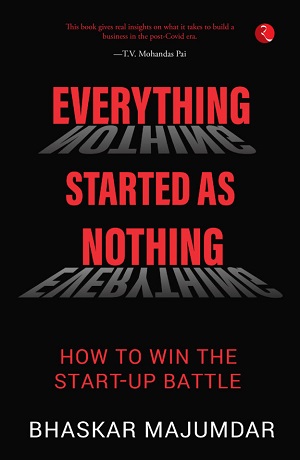Bhaskar Majumdar in his book Everything Started as Nothing: How to Win the Start-up Battle talks about the journey of a startup as well as founders. It takes you from the time an idea is born in your head to the time you exit a successful business that you have built and given your life to.
 Moving chronologically, the book talks about the challenges and dilemmas that an entrepreneur faces at each step. The author does not shy away from mentioning the potential pitfalls and mistakes that entrepreneurs are prone to. He intersperses his insights with the wisdom of many successful entrepreneurs, who share insights from their own journeys. Different voices give different views of the same or similar situation.
Moving chronologically, the book talks about the challenges and dilemmas that an entrepreneur faces at each step. The author does not shy away from mentioning the potential pitfalls and mistakes that entrepreneurs are prone to. He intersperses his insights with the wisdom of many successful entrepreneurs, who share insights from their own journeys. Different voices give different views of the same or similar situation.
Buy Everything Started as Nothing by Bhaskar Majumdar at Amazon
What I particularly appreciated in this book is the fact that it busts many myths. It demystifies much fashionable jargon associated with startups and founders. This awareness can help entrepreneurs. Particularly the young impressionable ones to not get lost in them. A smart reader will actually use them to his or her advantage.
Watch my Insta Live with Author Bhaskar Majumdar here
Let me walk you through some of the jargons in the book:
Glamour Quotient
Being media savvy can be beneficial if you do not let the vanity hit your head.
Koramangala Syndrome
This is a new term I learned about being struck in the eco-chamber of a start-up ecosystem.
Entrepreneurship being a one-way street
You will never be able to run your business as an option in life. It demands all that you have just like Bhakti.
Read More – Never Lost Again by Bill Kilday
Jugalbandi of founders, investors, and mentors. My question of where to find mentors remains unanswered though. It seems you just have to be destined to find one.
Relationship with data
While it is important to have access to data and base your decisions on it, it is also important not to be lost in them. Too much analysis and dependence on data can lead to Analysis Paralysis.
Everyone is a customer
This only shows you have not identified your key market. Hence would not be focused enough.
I have no Competition
Which essentially means you are playing in the absence of a market. If there is a market, many people would see the same opportunity as you. It is not a coincidence that similar businesses crop up at the same time. Or similar inventions were invented simultaneously and independently at the same time.
Read More – Jugaad Innovation by Navi Radjou, Jaideep Prabhu, Simone Ahuja
Intrapreneurship
This becomes very relevant once the organization attains a certain size. It is also an underrated aspect in most large organizations that keep looking outside for innovation inside.
Celebrating Failure
This is where I slightly disagree with the author. I think failures should only be spoken about when they have eventually led to success. Celebrating the failures of twenty-something, who have not tried enough creates a wrong notion. Just like struggling actors who keep looking for sympathy.
Read More – Why I Failed by Shweta Punj
Examples support Narrative
Language is simple and conversational. The narrative comes with ample examples to support the insights by the author. He himself is a leading investor. I think both the title and cover design of the book does not do justice to the book. However, it is a subjective matter.
Read More – 8 Steps to Innovation by Vinay Dabholkar & Rishikesha T. Krishnan
There is something in this book Everything Started As Nothing for anyone who is on an entrepreneurial journey. Or even thinking of taking that path.
Read it.








